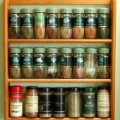Growing Your Own Indoor Herb Garden
Just because there's still snow on the ground- or perhaps just a chill in the air depending on where you're living- that's no reason you can't start taking in the delight of gardening by starting an indoor herb garden. Even if you live in an apartment building, you can start your own indoor herb garden as long as you have a sunny window. What you need is a window with south or western exposure which will give your plants about 5 hours of sunlight every day.
There are a few different ways to start your own indoor herb garden, one being by simply buying a few small plants such as thyme, mint, or rosemary from your local supermarket, florist, or nursery and putting them on your window sill. Or, if you're really keen, you can start your own plants from seed which is much easier than it sounds. To do this, first you need some pots. Heavy clay or terra cotta pots are preferred as they allow air and water to circulate, however any pot with good drainage will do. It's best to have small pots with a 6 inch diameter at the top, as these will be small enough for compact plants, but should still allow for enough growing room. Good choices for direct seeding include compact dill, oregano, thyme, and mint. Be careful, when selecting your seed packets from the store, that they specify "compact variety", as the regular varieties are more difficult to grow indoors as they tend to want to spread too much. To start the seeds, just fill each pot with regular potting soil which is sold at any garden store or supermarket. Tuck the seeds into the soil at the depth specified on each package and dampen the soil.
To maintain your window sill garden, keep the pots in a sunny window and keep the soil damp. The pot you purchased should come with a matching dish or plate at the bottom which should absorb any extra water. It's important not to over-water so that the soil is constantly soaked, but just moderately damp throughout. Once you start to see sprouts popping up from your soil, be extra careful not to water too much as this can cause the roots to rot. In addition to ample light and water, your pots should be kept away from extremes in temperature. You don't want your indoor garden right in front of a radiator or next to the kitchen stove. It's also a good idea to turn your plants regularly so that all sides get even exposure to the light. Once you have your garden going, don't be afraid to use it. It's very handy to pinch off a few leaves of rosemary to help season your chicken, or to add some oregano to your spaghetti sauce. One of the best ways to keep your plants healthy is to use them frequently! The more leaves you use, the more they'll grow back. Have fun and happy gardening and cooking!

